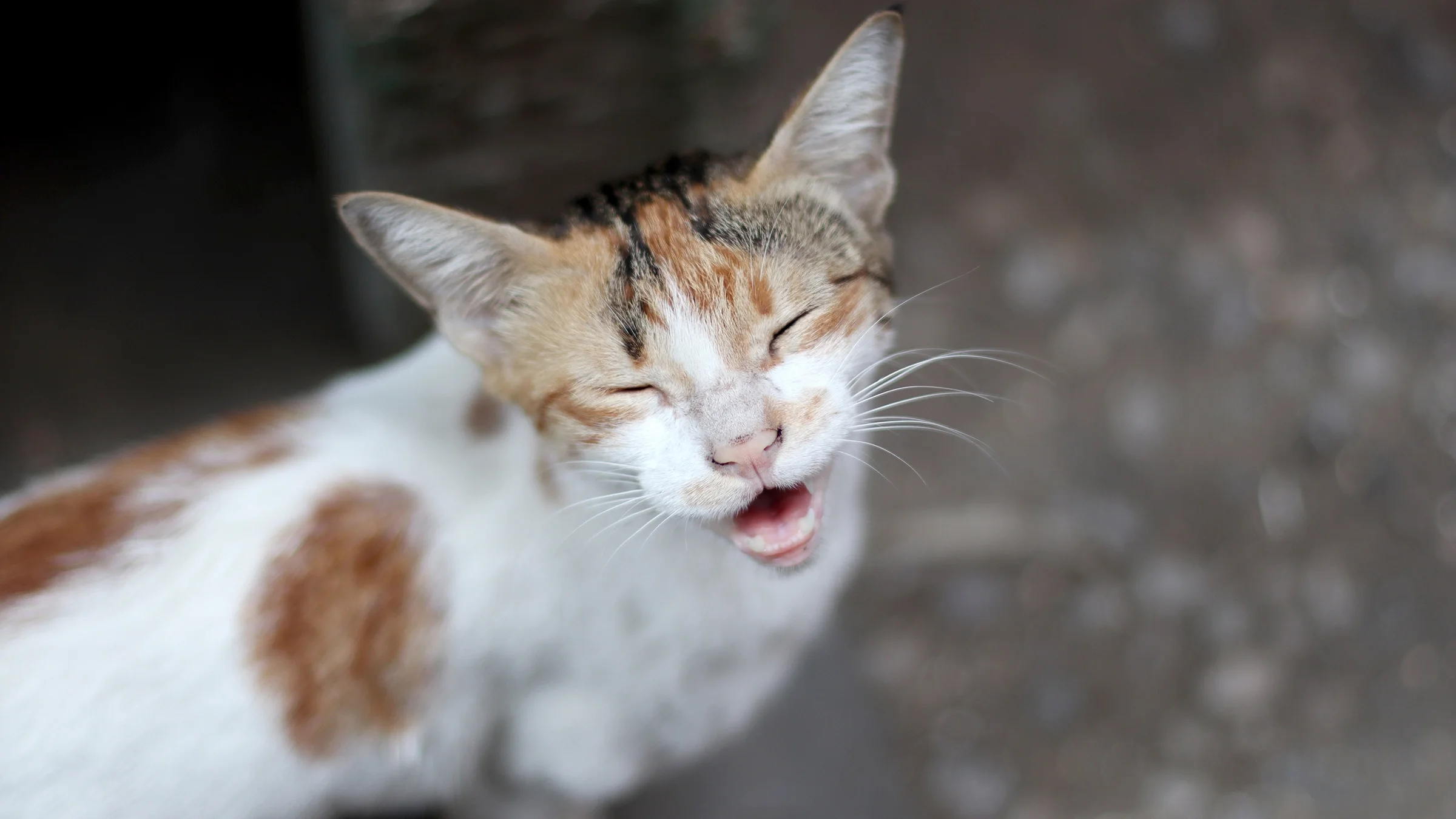Key takeaways:
Cats meow primarily to get human attention, not to communicate with other cats.
Cats use a variety of meow sounds to convey different messages. If you pay close attention to a situation, you may be able to figure out what your cat is trying to tell you.
Meowing can be a nuisance at night when you’re trying to sleep. But there are steps you can take to manage it.
Purring aside, there is nothing more endearing about cats than their meowing. If you’re in doubt, consider the phrase “the cat’s meow.” It refers to something or someone that’s admired, according to Merriam-Webster.
What those meows mean, however, can be challenging for humans to interpret. Below, we’ll dive into what experts say about meowing, which is often referred to as mewing, too. We’ll also look at managing nighttime meowing and when to see a vet.
Why is your cat meowing?
If you’ve been around kittens, you’ve no doubt heard them crying. Young cats meow to communicate with their mother. But as they grow and are exposed to people, their meowing shifts to humans. The trouble is, humans don’t often understand what cats are trying to say.
Search and compare options
Here are six possible reasons for your cat’s meowing.
1. They’re happy to see you
Of the numerous reasons that cats meow, greeting their people is the most common.
Interestingly, those meows may change, depending on what a cat wants. “Cats have different meows based on different behaviors,” said Dean Vicksman, DVM, president of EveryCat Health Foundation in Denver. For instance, your cat might have a different meow for greeting you versus when they’re asking for food.
2. They’re asking you for one of their basic needs
Meowing seems to have developed as cats became domesticated and socialized with humans. Cats learned that meowing helped them get what they wanted or needed.
“The behavior evolved over thousands of years of domestication, as cats learned it was an effective way to get shelter, food, and care from people,” said Susan Nilson, a cat and dog behavior specialist and owner and founder of The Cat and Dog House.
Getting human help reduced the amount of energy cats had to expend to survive, making their lives easier. What’s more, Nilson said, “It’s thought that the sound of a cat’s meow is instinctively appealing to human ears because it’s similar to a baby’s cry.”
Pest prevention: Revolution is an FDA-approved medication that kills adult fleas and controls flea infestations. Learn more about Revolution.
Teeth cleaning fees: Taking care of a cat’s teeth benefits their overall health. Here’s a breakdown of the cost of teeth cleaning at a vet’s office.
Furniture fanatics: Does your cat love to claw at your couch? You’re not alone. These cat owners share their tips and tricks to manage cat scratching.
3. They’re stressed
When cats are scared, stressed, or anxious, they often turn to meowing, Nilson said. Take, for instance, a newly adopted cat or a cat who’s returned home from a stressful vet visit. They may wander around the home, meowing constantly. But they should stop once they feel safe and relaxed.
4. They’re in pain or sick
If you notice your cat’s meowing has become excessive or sounds louder or more guttural, those could be signs that something’s wrong. They may be in pain or discomfort from injury, illness, or an underlying medical condition. If there are other behavioral changes like soiling outside the litter box, hiding more than normal, or becoming aggressive, take your cat to a veterinarian.
5. They’re calling to their kittens
Mother cats use a variety of sounds to communicate with their kittens, including meowing. What’s more amazing: One study suggests that kittens learn to recognize their mother’s specific meows and chirps.
Read more like this
Explore these related articles, suggested for readers like you.
6. They might have separation anxiety
Cats, like dogs, can experience separation anxiety when their owner leaves. There are numerous signs that your cat might be experiencing separation anxiety, one being excessive meowing.
How much meowing is normal?
Normal meowing varies from one cat to the next. How often a cat meows depends on several factors, including their personality, the circumstances, and their breed. But by paying attention to how often and when your cat meows over time, you’ll have a better idea of what’s normal.
Some cats meow naturally more than others, depending on their personality or breed. Siamese cats, for instance, are known to be quite vocal. Frequent vocalizations to their humans are one of the breed’s characteristics. Their meows aren’t only distinctive; they can also be loud.
How much you’ve reinforced their meowing may also determine how much your cat meows. Say, for instance, that you run to the kitchen to feed them or to a door to let them out whenever they meow. Because the meow is so effective at getting what they want or need, it’s highly likely your smart cat will repeat the meowing behavior.
When should you see a vet about cat meowing?
If you notice your cat meowing more or less than normal, call a veterinarian. That becomes even more critical if there are other behavioral changes, such as:
Behaving aggressively
Changing their litter box habits
Acting confused
Moving gingerly
Not eating or drinking as much
What if your cat’s meowing is waking you up at night? [Nighttime meowing]
Cats tend to be active at night for various reasons. So if you’re constantly getting awakened by crying, you’re not alone. Here are some common reasons for their nocturnal mews and how you can respond.
Hunger
If your cat wakes you up meowing because they’re hungry, give them a little food before you go back to bed.
Lack of sleep space
Create a quiet, comfortable sleeping area for your cat.
“Many cats prefer to sleep in an elevated or covered space or both as this helps them feel more secure,” Nilson said. A cardboard box might even work.
Playful energy
Cats often engage in hunting games at night. They may meow so much that they wake you up.
These four strategies may tame their playful energy:
Get your cat on a consistent feeding schedule, including a meal before bedtime. “Many cats will settle down for a grooming session after a meal of wet food, which is naturally relaxing and more likely to promote sleep,” Nilson said.
Set an automatic feeder to dispense food right before your cat typically starts running around and meowing. For most cats, that’s about dawn, Nilson said.
Schedule a play session before bed. Vicksman said to use cat-friendly playthings like a toy attached to a string. These toys help your cat chase (or hunt) while burning off excess energy.
Provide environmental enrichment during the day. This will help calm your cat and reduce feelings of stress, anxiety, and frustration, Nilson said. Set out interactive games, food puzzles, scratching posts, vertical spaces, and hiding spots.
The bottom line
Look at your cat’s meow as a gift, a unique form of communication between you and your feline friend. Of course, there’s much more to a cat’s meow than meets the human ear. It may be impossible to know what those meows mean all the time. But tuning into your cat’s unique vocalization will help you understand whether they’re in pain, happy to see you, or stressed out.
If your cat starts to meow more (or less) than normal and has other unusual symptoms like hiding more or being aggressive, there could be something wrong. Take them to a veterinarian and discuss your concerns.

Why trust our experts?



References
American Animal Hospital Association. (2024). Don’t go! Separation anxiety in pets.
McWreath, A., et al. (2021). The cat’s meow. Veterinary Information Network.
Merriam-Webster. (n.d.). Cat’s meow.
Prato-Previde, E., et al. (2020). What’s in a meow? A study on human classification and interpretation of domestic cat vocalizations. Animals.
Seksel, K., et al. (2014). Understanding feline communication. World Small Animal Veterinary Association World Congress Proceedings.
Szenczi, P., et al. (2016). Mother-offspring recognition in the domestic cat: Kittens recognize their own mother’s call. Developmental Psychobiology.
The Cat Fanciers’ Association. (n.d.). Siamese.


















